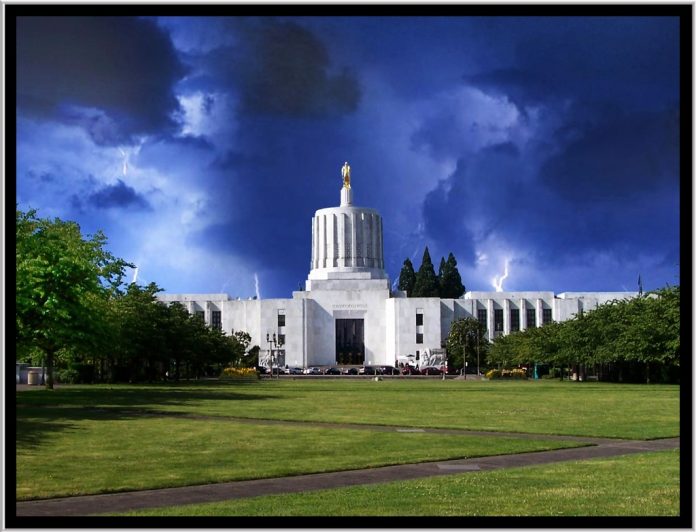Oregon’s proposed Gross Receipts Tax, on top of a corporate income tax, won’t improve its anti-business climate. (Opinion)
By Andrew Wilford
With Washington state instituting a new income tax (excuse me, an “excise tax on capital gains”) and California always chock-full of ideas to tax anything that moves, Oregon was probably beginning to feel left out of its Pacific neighbors’ tax hike parties. But a ballot measure that is likely to be before Oregon voters this November could create a new tax that puts even the most half-baked ideas out of California to shame.
Oregon is hardly a business-friendly state to begin with. Not only does the state have a relatively high 7.6 percent top marginal corporate income tax rate — the thirteenth-highest top marginal rate in the country — it also imposes a 0.57 percent Corporate Activity Tax (CAT) on gross receipts for businesses with more than $1 million in Oregon sales.
If a 0.57 percent tax seems low, remember that while corporate income taxes are assessed purely on profits, gross receipts taxes are assessed on all sales. The Tax Foundation’s Jared Walczak has estimated that for a business with a fairly average 7 percent profit margin, a 0.57 percent gross receipts tax is really more like a 6.72 percent corporate income tax, on top of the already existing 7.6 percent traditional corporate income tax. Businesses operating in the Portland metro area can tack on another 6.6 percent in local income taxes as well.
For all those reasons, Oregon is ranked by the Tax Foundation as having the 2nd-most burdensome corporate income tax code already. But should IP-17 be approved by Oregon voters in November, the state’s current tax treatment of businesses will appear positively amicable by comparison.
Though Oregon already has a minimum corporate income tax, IP-17 would create another minimum tax on top of and in addition to the existing ones. The minimum tax rate under IP-17 would be an eye-popping 3 percent of all Oregon-sourced gross receipts above $25 million — equivalent to a 42.9 percent corporate income tax rate for that aforementioned hypothetical business with a 7 percent profit margin (a deduction can be claimed for the CAT that cannot be claimed for this new proposed minimum tax). That’s twice the federal corporate income tax rate!
That hypothetical business would owe not only that 42.9 percent effective gross receipts tax rate, but also an effective 6.72 percent CAT rate, and the 21 percent federal income tax rate. Taken together, that cumulative 70.62 percent rate is right around what business owners refer to colloquially as the “we’re getting the heck out of here” rate. Businesses with lower profit margins would struggle just to break even.
What elements of their operations that businesses can’t move out of Oregon would make their way to Oregon consumers at substantial markups as those businesses struggle to absorb the tax. That means that those Oregonians who don’t lose their jobs as their employers flee the state would see their cost of living skyrocket.
That may seem a drastic reaction to a “3 percent tax,” but it is hard to overstate just how out-of-step IP-17 would put Oregon with other states. Most states with a gross receipts tax do not also have a corporate income tax, and almost none of them have rates even approaching 3 percent. The exception that proves the rule is Washington state, which imposes a 3.3 percent gross receipts tax solely on radioactive waste disposal companies — all others face far lower rates.
The bright side for Beaver State residents should IP-17 go into effect is that the revenue collected from the tax would be returned to Oregonians in the form of a $750 rebate. Cash is always nice, but a $750 check won’t replace a salary.
IP-17 is well-crafted to appear reasonable by exploiting the unfamiliarity of the average voter with the difference between gross receipts and corporate income taxes. Hopefully, should voters approve IP-17 this November, they at least know what they’re getting themselves into.
Andrew Wilford is a policy analyst with the National Taxpayers Union Foundation, a nonprofit dedicated to tax policy research and education at all levels of government.
Originally published by RealClearPolicy. Republished with permission.
For more Budget & Tax News.












AND TO THINK WE WENT TO WAR WITH THE MOTHER COUNTRY OF ENGLAND OVER TAXES.